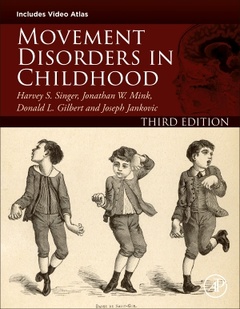Movement Disorders in Childhood (3rd Ed.)
Auteurs : Singer Harvey S., Mink Jonathan W., Gilbert Donald L., Jankovic Joseph

Movement Disorders in Childhood, Third Edition provides the most up-to-date information on the diseases and disorders that affect motor control, an important area of specialization within child neurology. In this new edition, each chapter has been fully revised to include all of the latest scientific and therapeutic advances. Updates include new insights in motor development, control, goal-directed and habitual behaviors, classifications of movements and their complex and integrated circuitry. The authors also discuss developments in pathophysiologic mechanisms, immunology and metabolic disorders. New chapters include coverage of genetics of movement disorders and movement disorders in psychiatric conditions. Appendices include an updated and revised drug index and genetic search strategy.
An updated Companion website hosts selected educational videos to help diagnose movement disorders.
Section I. Overview 1. Basal Ganglia Anatomy, Biochemistry, and Physiology 2. Cerebellar Anatomy, Biochemistry, Physiology, and Plasticity 3. Classification of Movement Disorders 4. Diagnostic Evaluation of Children with Movement Disorders 5. Motor Assessments
Section II. Developmental Movement Disorders 6. Transient and Developmental Movement Disorders
Section III. Paroxysmal Movement Disorders 7. Tics and Tourette Syndrome 8. Motor Stereotypies 9. Paroxysmal Dyskinesias
Section IV. Hyperkinetic and Hypokinetic Movement Disorders 10. Chorea, Athetosis, and Ballism 11. Dystonia 12. Myoclonus 13. Tremor 14. Ataxia 15. Parkinsonism 16. Hereditary Spastic Paraplegia
Section V. Selected Secondary Movement Disorders 17. Metabolic Disorders with Associated Movement Abnormalities 18. Movement Disorders in Autoimmune Diseases 19. Movement Disorders in Sleep 20. Cerebral Palsy 21. Movement Disorders and Neuropsychiatric Conditions 22. Drug-Induced Movement Disorders in Children 23. Functional Movement Disorders
Appendix A: Drug Appendix Appendix B: Search Strategy for Genetic Movement Disorders
Jonathan W. Mink, MD PhD is the Frederick A. Horner, MD Distinguished Professor in Pediatric Neurology at the University of Rochester, where is also Professor of Neurology, Neuroscience, and Pediatrics. He is currently Chief of the Child Neurology Division and Vice Chair of the Department of Neurology at the University of Rochester. He graduated from the Medical Scientist Training Program at Washington University and then completed residency training in Child Neurology at St. Louis Children’s Hospital. He completed a fellowship in Movement Disorders at Washington University and remained on the faculty there until moving to his current position at the University of Rochester in 2001. His research interests include basal ganglia mechanisms in movement disorders, experimental therapeutics in pediatric movement disorders,
- Provides the only current reference specifically focused on childhood movement disorders
- Investigates the underlying etiologies and mechanisms of these disorders
- Revised and updated with new materials and a more disease-oriented approach
- Contains new chapters on the genetics of movement disorders and movement disorders in psychiatric conditions
- Includes new videos of instructive and unusual childhood movement disorders
Date de parution : 07-2022
Ouvrage de 746 p.
21.5x27.6 cm



